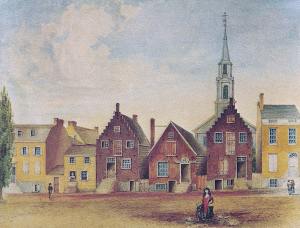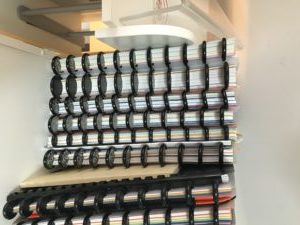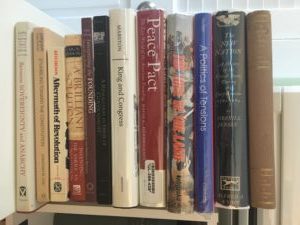Over the last couple of years, I've read many blog posts wherein authors discuss their successes and struggles with turning their dissertations into publishable book manuscripts. I've enjoyed, sympathized with, and benefited from these posts because I too have been trying to turn my dissertation into a book manuscript. However, there's one type of post on this subject that I haven't yet seen: How to know if your dissertation is just a dissertation.
This thought has been churning in my mind for most of this year.
Is My Dissertation A Book?
By all accounts, I should be able to turn my dissertation into a book.
I was fortunate and privileged in my graduate education. I attended a good, funded doctoral program where I worked with one of the best historians and writers in the profession. Ever practical in his outlook, my advisor does not direct his students' dissertations, he directs first drafts of their books.
 This means my dissertation never had a literature review. Most of the references I made to other scholars occur in my notes, not the main text. And while not perfectly written, my dissertation conveys its ideas with clear writing and active verbs.
This means my dissertation never had a literature review. Most of the references I made to other scholars occur in my notes, not the main text. And while not perfectly written, my dissertation conveys its ideas with clear writing and active verbs.
This is not to imply that I wrote a dissertation ready for publication as a book. My dissertation has some serious flaws.
First, it purported to trace how the people of Albany, New York created first Dutch, then British, and finally American identities. That's a false claim. My first chapter provided a very brief overview of Albany and its people during the Dutch and early English periods. Chapter two begins in 1750.
Second, chapter four implies that the fighting of the War for Independence ended right after the Battle of Saratoga in 1777. In reality, fighting carried on in vengeful, civil war-like manner until 1784. Albany and its people played a big role in this fighting. Chapter five begins in the 1780s.
Third, I didn't think broadly enough when I framed my dissertation. My work speaks to an important local and small piece of the historiography. However, the events, politics, and interactions I explored and interpreted could have added valuable insight to the larger story of American and United States history, but they don't because I didn't frame and situate them properly.
Plus, there are instances when I did not consider my sources carefully enough. Further consideration would have changed parts of my argument.
These are all flaws that I can fix, and in some cases, I've already fixed them. If I had to guess, I would say that my book manuscript needs somewhere between 6-12 months worth of work before I could send it to a publisher for consideration.
So why have I been thinking about the question "how do you know if your dissertation is just a dissertation?"
Is My Dissertation Just a Dissertation?
 One year ago this week, I shelved my book manuscript. I didn't want to put it aside; I was making great progress. However, good issues and problems due to the quick growth of Ben Franklin's World had piled up and required my attention before they hurt the podcast. I made the decision to set aside my book project and work on the podcast full-time for a month or two.
One year ago this week, I shelved my book manuscript. I didn't want to put it aside; I was making great progress. However, good issues and problems due to the quick growth of Ben Franklin's World had piled up and required my attention before they hurt the podcast. I made the decision to set aside my book project and work on the podcast full-time for a month or two.
Here we are one year later. I've made almost no progress on my book since I set it aside. My lack of progress is not for lack of trying. What I thought would be a one or two month leave of absence turned into a six-month hiatus.
I attempted to return to the project in February. I wasn't sure where I wanted to jump back in, so I took chapters one and three with me on a week-long, distraction-free retreat. Chapter one is a new chapter. The binder I took with me consisted of an outline for the chapter and the research I needed to write it. Chapter three is an old chapter that needs some slight reframing and good editing. I thought having two different chapters in two different states of being would allow me to pick and choose how I wanted to wade back into my project.
I didn't make much progress. I tried for hours and days to get back into my project. I tried free writing, editing on my computer, editing with pen and paper, the Pomodoro technique to encourage short bursts of progress, and long walks to generate ideas and think my material through--nothing worked. 18th and early 19th-century Albany, places which had once seemed so familiar to me now seemed like foreign countries.
Because I'm stubborn, I've been trying on and off to get back into my project as time has allowed. It's been six months since February and I haven't made much progress.
Part of my inability to get back into my project could be that my podcast work doesn't allow for more than a few hours of book time a week. (Some weeks it doesn't even allow for that.) Therefore, dedicated focus has been a problem. Subject-matter fatigue could be another factor. I've been working on this project since 2004.
Moving On
Regardless of what is causing my block, it's time to stop being stubborn about it. It's not productive and it's not fun. I've decided to stop trying to force myself to work on the project. I'm moving on.
 I'm starting work on my next long-term research project: The Articles of Confederation. Over the last year and a half, I've been mining footnotes and steadily accumulating books about the subject. No one has undertaken a serious study of the Articles since Merrill Jensen in 1950.
I'm starting work on my next long-term research project: The Articles of Confederation. Over the last year and a half, I've been mining footnotes and steadily accumulating books about the subject. No one has undertaken a serious study of the Articles since Merrill Jensen in 1950.
In the current historiography, the Articles appear as one of the most maligned aspects of the Revolution. Many scholars treat them as a mere stepping stone to the Constitution of 1787. I intend to look at the creation of this government within the context of the American Revolution. I'm curious about how the Continental Congress drafted them, what regional issues accelerated or hindered their drafting, and whether their creation and ratification fostered a sense of national identity.
I'm really excited about my new project. But saying "hello" to the Articles of Confederation means I need to say "goodbye" to Albany, at least for now.
Will I return to this project and see it into the great book I know it could be? I wonder.
I hope the opportunity to read and think deeply about a different aspect of early American history will somehow reconnect me with Albany.
But it may turn out that my dissertation was just a dissertation.